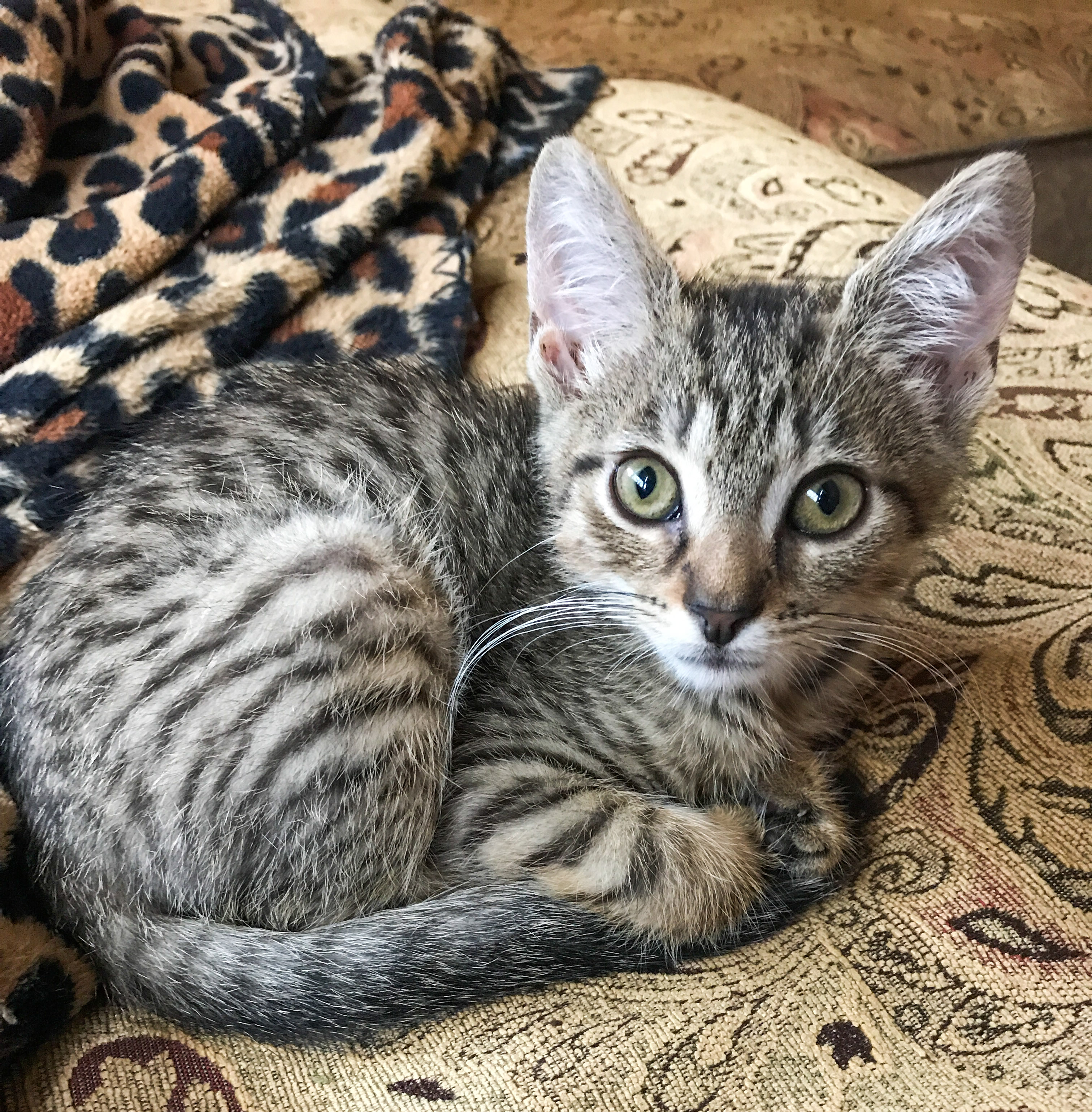
We adopted Ranger when he was an 8-week old kitten. I fell in love with Ranger the moment I laid eyes on him. We were not looking to adopt a kitten when we adopted Ranger, but the universe put us together, and I could not be happier. By the time we adopted Ranger, he had been dewormed, tested negative for FIV & FeLV, microchipped, treated for fleas, and was up to date on his shots. For all intents and purposes, Ranger was a healthy kitten. With that being said, any healthy pet can develop or have underlying or undetected conditions. I just did not expect Ranger to have any issues shortly after he joined our family.
Introduction:
I knew Ranger’s background when I adopted him. The rescue group was very open about his history. He was found alone and scared outside near an extremely busy highway at only 4 weeks old during a hot spring day. Kittens ideally should be with their mother for at least 6 weeks, but no mother cat or siblings were in sight. The rescuer took Ranger to a nearby vet that gave him immediate medical attention. Ranger was in bad shape, but the vet and the rescue that took him under their wings nursed him back to health. Once we brought Ranger home, he was playful, energetic, had a healthy appetite, and used his litter box with no obvious issues. Unfortunately, the parasite saga was soon to begin.
The Parasite Saga:
Parasite: An organism that lives in or on an organism of another species (its host) and benefits by deriving nutrients at the other’s expense. (Oxford English Dictionary)
Parasites are a common problem with rescue kittens and cats (puppies & dogs too). They are easily treated when caught early. However, parasites are never to be taken lightly. If left untreated they can cause an array of health conditions and in some cases death.
Today, I am sharing the common parasites Ranger suffered from early on. By no means was Ranger close to death, but he was treated very early when the symptoms just started. Treatments were relatively easy, but parasites can be tricky. Bear in mind, Ranger had been dewormed twice before I adopted him, but many parasites are not worms and there is not a magic pill to get rid of every parasite at once.
Coccidia
Coccidia are microscopic single-celled organism or protozoa that live within cells of the intestinal lining. The most common symptom of Coccidia is a watery and foul-smelling mucus based diarrhea. Coccidiosis can lead to severe dehydration which can lead to organ complications and eventually death if left untreated.
Within a week of adopting Ranger, we noticed he developed diarrhea and the odor was disgusting. I took him in to see his doctor, and she determined Ranger had Coccidia. We started treatment right away. However, due to his weight and age, Ranger could not take a more effective antibiotic, so we gave him everything we could. Over the course of a week, Ranger improved, but never completely. We kept treating Ranger for the Coccidia until we finally got the upper hand and Ranger weighed enough to take a stronger antibiotic. We finally started seeing a dramatic improvement in Ranger. We finally got rid of the Coccidia.
Giardia
Giardia is a microscopic protozoan parasite that attaches to the intestinal wall. The most common symptom of-of Giardia is a soft, frothy, greasy diarrhea with an extremely foul odor. Giardiasis can also lead to severe dehydration which can lead to organ complications and eventually death if left untreated.
Around two months after his bout with Coccidia, we noticed Ranger once again had another severe case of diarrhea. Back to the vet we went, and we soon discovered that Ranger now had Giardia. At this point, we had adopted Marmalade and she ended up catching Giardia from Ranger. Ugh! Giardia is highly contagious especially when cats share a litter box like Ranger and Marmalade.
Naturally, I was curious as to why the Giardia was not seen in the fecal exams when he was diagnosed with Coccidia As is turns out, parasites are very savvy at hiding and lying dormant for even years without detection or symptoms. They may not show up in one stool sample, but show up in another.
The treatment of Giardia was easy, so both Ranger and Marmalade took their doses of medication. They went back to the vet for another fecal exam, and they both tested negative for Giardia! Yay!
Tapeworms
Tapeworms are intestinal parasites classified as cestodes in the class of parasitic flatworms. Tapeworms are typically caused by a kitten or cat ingesting an infected flea. A common symptom is actual pieces of the worms that have an appearance of grains of white rice in their stool or found near their rear end.
Ranger had been treated for fleas and had no sign of fleas when he was adopted. But low and behold, Ranger managed to have tapeworms! Ranger is strictly indoors, but there is no denying, he ingested an infected flea somehow, some way. I have never found a flea in our home, but the one flea that snuck in gave Ranger tapeworms. Yuck! He had no common appearance of the grains of rice. I found the tapeworm by simply scooping out his litter and discovered a 3 inch long disgusting flat looking worm. I took the worm (dried up at that point) to his vet. His doctor quickly knew Ranger had tapeworms. So, the treatment was easy, but once again Ranger took his doses of the prescribed medication. We have not seen a flea or tapeworm since then.
Closing:
 I jokingly called Ranger, the cutest little parasite carrier I have ever seen!
I jokingly called Ranger, the cutest little parasite carrier I have ever seen!
Seriously, is he not a cutie? It is hard to believe this adorable kitten had so many parasites in him.
Ranger was a trooper through all of the medications, testing and vet visits. He took it like a champ, and never complained even when the medications tasted nasty.
I can’t tell you how many times I had to empty the litter box, disinfect, add fresh litter only to have to do it all over again. How many bowls I cleaned daily. How many times I disinfected the floors, bedding, if you could wash it, I washed it. These parasites were frustrating, messy and often times just plain foul. But, it was worth every pound of litter, ever mile to the clinic, every second I held my breath to not gag over the smell to make sure Ranger and Marmalade were as healthy as I could have a say in the matter. What I have learned over the years is you can only control so much. I watched the litter box like a hawk. I had followed the treatment instructions for the Coccidia, Giardia, and Tapeworms, but another parasite would challenge Ranger’s health that brought me to tears, sleepless nights, and fear of losing Ranger.
Please check back next week for part 2 of Ranger’s Parasite Story.
Thank you to Riverview Animal Clinic for giving Ranger the best care I could ask for and to MomaKat Rescue for saving Ranger and allowing me to love him forever.
Advice:
No matter how healthy or cute your pet looks, please keep regular wellness checkups with your pet’s veterinarian. Just like blood work, a fecal exam can show more than what we can see with our own eyes. Preventive care and prompt treatment is always that best route. It may seem odd, but observing your pet’s stool can say a lot about your cat or dog’s health. Finally, although your nose and eyes may recognize a problem, please do not self-diagnose and rely on over-the-counter medications. A microscope with trained eyes is always the better option to make sure your pet gets properly diagnosed and appropriately treated.


